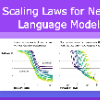The scaling law, which involves the brute-force expansion of training datasets and learnable parameters, has become a prevalent strategy for developing more robust learning models. However, due to bottlenecks in data, computation, and trust, the sustainability of the scaling law is a serious concern for the future of deep learning. In this paper, we address this issue by developing next-generation models in a parsimonious manner (i.e., achieving greater potential with simpler models). The key is to drive models using domain-specific knowledge, such as symbols, logic, and formulas, instead of relying on the scaling law. This approach allows us to build a framework that uses this knowledge as "building blocks" to achieve parsimony in model design, training, and interpretation. Empirical results show that our methods surpass those that typically follow the scaling law. We also demonstrate the application of our framework in AI for science, specifically in the problem of drug-drug interaction prediction. We hope our research can foster more diverse technical roadmaps in the era of foundation models.
翻译:暂无翻译


















